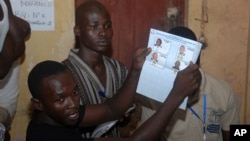DAKAR —
Guinea's electoral commission says it will begin announcing partial results from the legislative polls on Wednesday, but that full provisional results could still be days away due to logistical challenges centralizing results.
President Alpha Conde is calling on political leaders to respect the results, but the opposition is already saying it could dispute them, raising concerns of possible unrest.
"Guineans have once again shown their maturity when it comes to deciding their futures via the ballot box," said Conde in a national address on Tuesday, the eve of Guinea's Independence Day holiday. "That is why I am once again inviting all political party leaders to follow the will of the people and receive with maturity the results of the election, as it is only an election that can confer legitimacy in a democratic government."
Guineans are anxiously awaiting official results of votes cast for 114 National Assembly members on Saturday, and local media and political parties have been conducting unofficial counts of their own.
The opposition coalition continues to accuse the ruling party of working to rig elections, accusations that the ruling party says are not true.
For Mouctar Diallo, an opposition leader, the delay in announcing official provisional results is "suspicious."
"If the electoral commission announces the actual results from the ballot boxes, then we can accept the results despite all that was done to prevent our supporters from voting. There will not be a problem," he said. "But if other results are announced, then rest assured that people won't put up with it."
Election observers have highlighted several issues with the voter list, voter-card distribution and the voting itself, but said those problems, some of them logistical, did not undermine the poll's credibility.
Saturday's election followed two years of delays due to opposition and government disagreement over how the vote would be organized, years marked by deadly bouts of opposition protest and ethnic clashes in both Guinea's capital and interior.
Analysts say disputes over the impending results could once again inflame tensions and destabilize the country.
Guinea was thrust into chaos at the end of 2008 following the death of its authoritarian president, Lansana Conte, and a subsequent military coup.
Getting a new parliament in place is seen as the last step to what has been a rocky transition to democracy.
Zakaria Camara contributed reporting from Conakry, Guinea.
President Alpha Conde is calling on political leaders to respect the results, but the opposition is already saying it could dispute them, raising concerns of possible unrest.
"Guineans have once again shown their maturity when it comes to deciding their futures via the ballot box," said Conde in a national address on Tuesday, the eve of Guinea's Independence Day holiday. "That is why I am once again inviting all political party leaders to follow the will of the people and receive with maturity the results of the election, as it is only an election that can confer legitimacy in a democratic government."
Guineans are anxiously awaiting official results of votes cast for 114 National Assembly members on Saturday, and local media and political parties have been conducting unofficial counts of their own.
The opposition coalition continues to accuse the ruling party of working to rig elections, accusations that the ruling party says are not true.
For Mouctar Diallo, an opposition leader, the delay in announcing official provisional results is "suspicious."
"If the electoral commission announces the actual results from the ballot boxes, then we can accept the results despite all that was done to prevent our supporters from voting. There will not be a problem," he said. "But if other results are announced, then rest assured that people won't put up with it."
Election observers have highlighted several issues with the voter list, voter-card distribution and the voting itself, but said those problems, some of them logistical, did not undermine the poll's credibility.
Saturday's election followed two years of delays due to opposition and government disagreement over how the vote would be organized, years marked by deadly bouts of opposition protest and ethnic clashes in both Guinea's capital and interior.
Analysts say disputes over the impending results could once again inflame tensions and destabilize the country.
Guinea was thrust into chaos at the end of 2008 following the death of its authoritarian president, Lansana Conte, and a subsequent military coup.
Getting a new parliament in place is seen as the last step to what has been a rocky transition to democracy.
Zakaria Camara contributed reporting from Conakry, Guinea.








